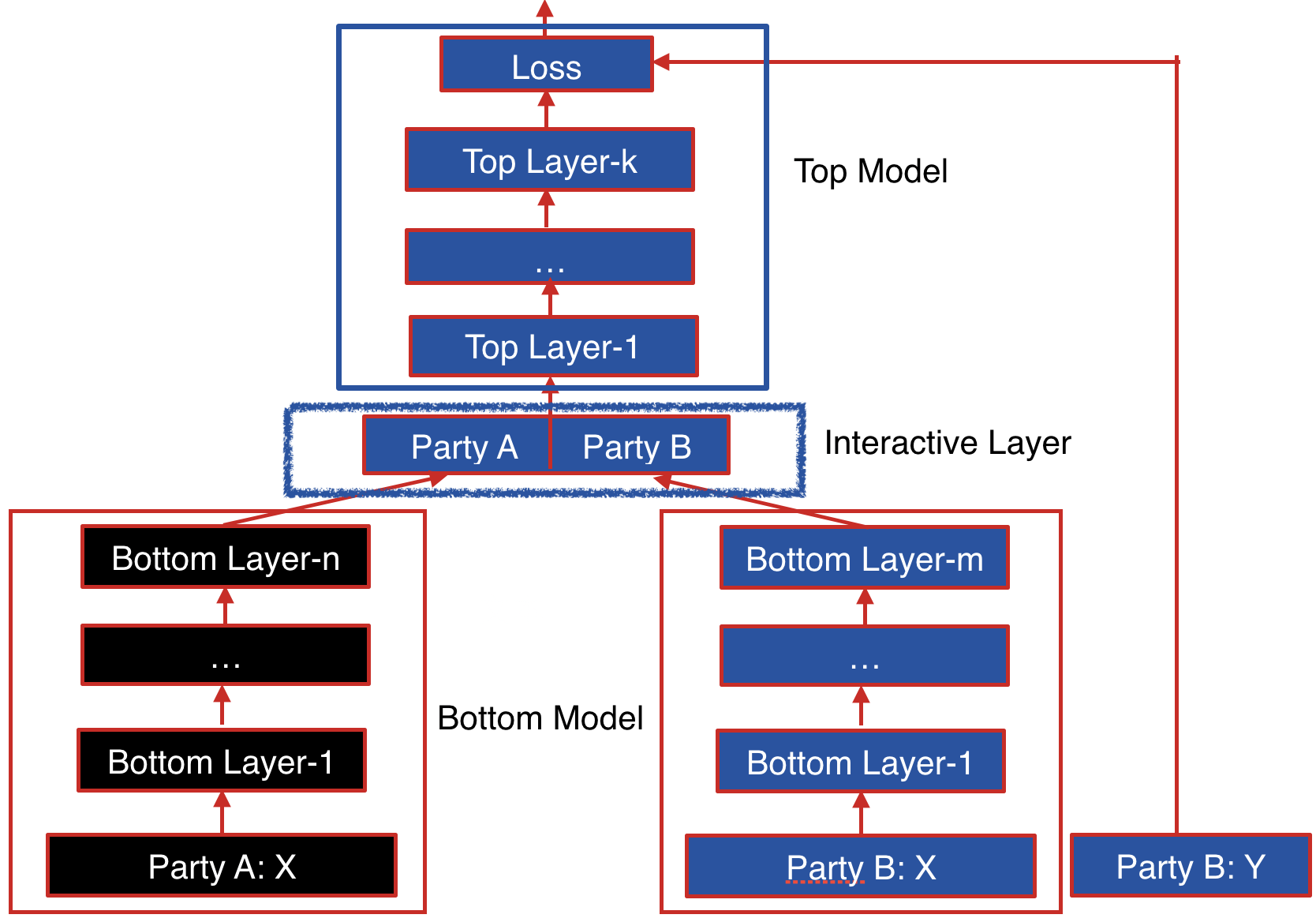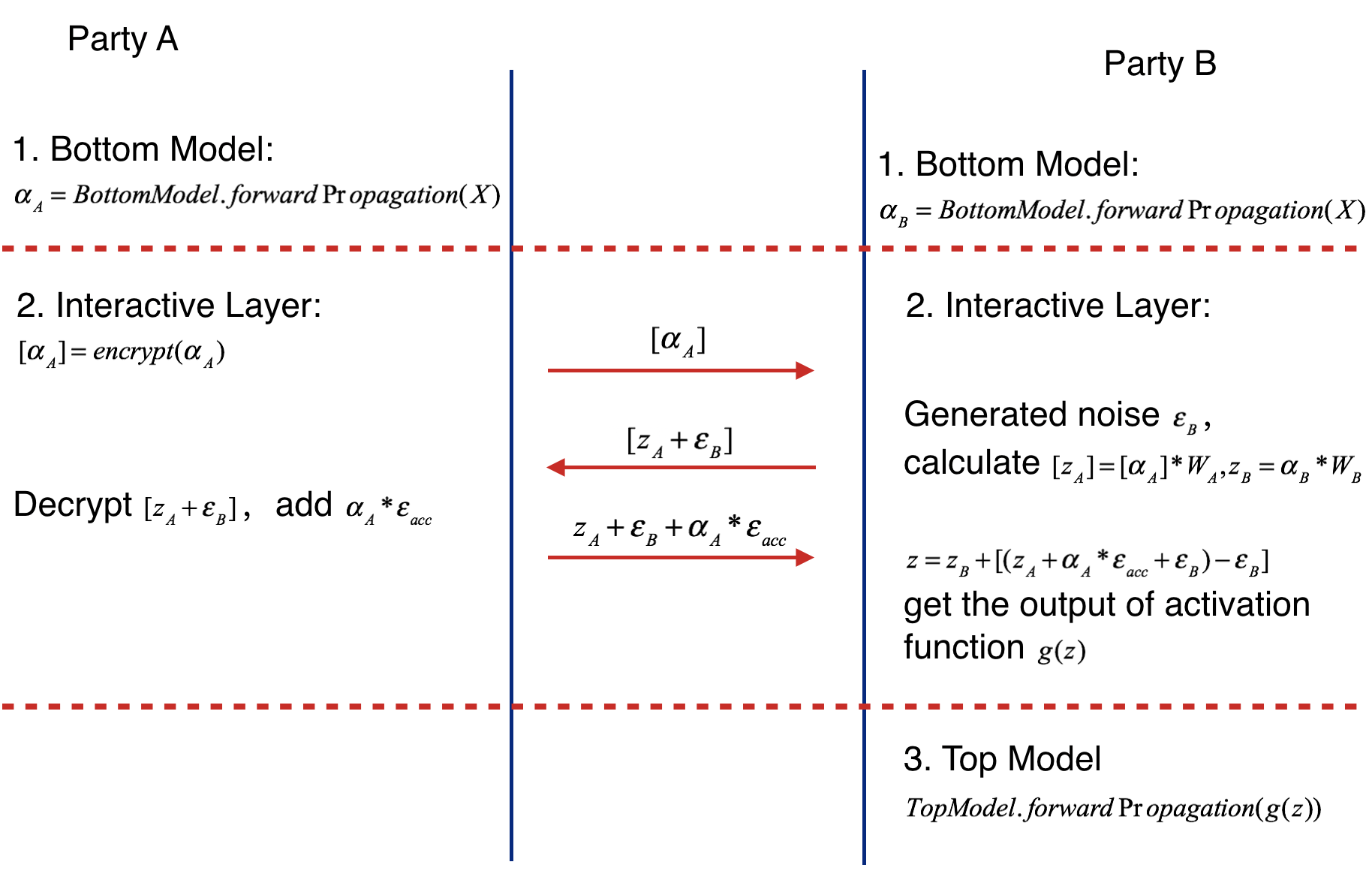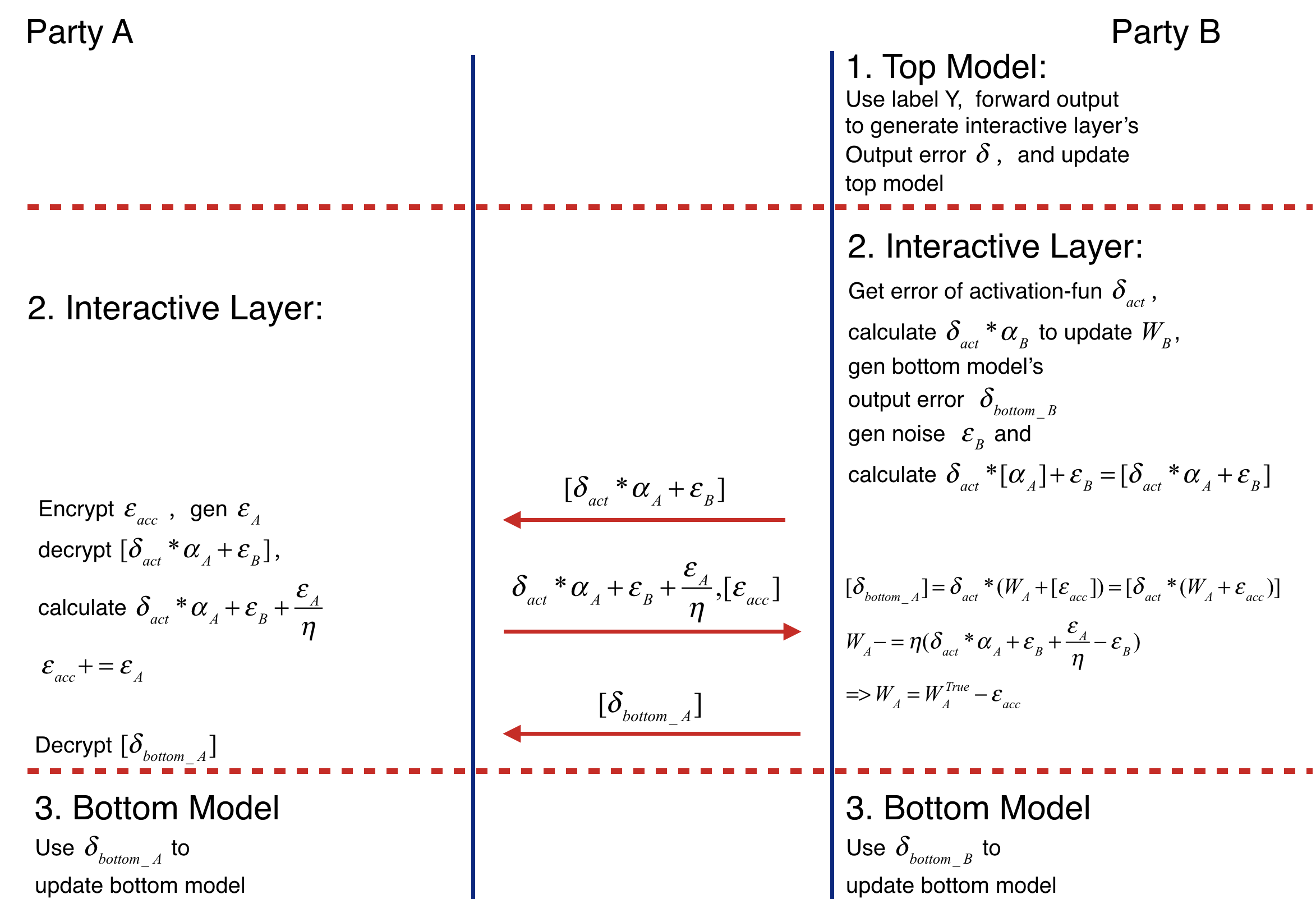Heterogeneous Neural Networks¶
Neural networks are probably the most popular machine learning algorithms in recent years. FATE provides a federated Heterogeneous neural network implementation.
This federated heterogeneous neural network framework allows multiple parties to jointly conduct a learning process with partially overlapping user samples but different feature sets, which corresponds to a vertically partitioned virtual data set. An advantage of Hetero NN is that it provides the same level of accuracy as the non privacy-preserving approach while at the same time, reveal no information of each private data provider.
Basic FrameWork¶
The following figure shows the proposed Federated Heterogeneous Neural Network framework.

Party B: We define the party B as the data provider who holds both a data matrix and the class label. Since the class label information is indispensable for supervised learning, there must be an party with access to the label y. The party B naturally takes the responsibility as a dominating server in federated learning.
Party A: We define the data provider which has only a data matrix as party A. Party A plays the role of clients in the federated learning setting.
The data samples are aligned under an encryption scheme. By using the privacy-preserving protocol for inter-database intersections, the parties can find their common users or data samples without compromising the non-overlapping parts of the data sets.
Party B and party A each have their own bottom neural network model, which may be different. The parties jointly build the interactive layer, which is a fully connected layer. This layer's input is the concatenation of the two parties' bottom model output. In addition, only party B owns the model of interactive layer. Lastly, party B builds the top neural network model and feeds the output of interactive layer to it.
Forward Propagation of Federated Heterogeneous Neural Network¶
Forward Propagation Process consists of three parts.
- Part Ⅰ
Forward Propagation of Bottom Model.
- Party A feeds its input features X to its bottom model and gets the forward output of bottom model alpha_A
- Party B feeds its input features X to its bottom model and gets the forward output of bottom model alpha_B if active party has input features.
- Part ⅠⅠ
Forward Propagation of Interactive Layer.
- Party A uses additive homomorphic encryption to encrypt alpha_A(mark as ), and sends the encrypted result to party B.
- Party B receives the , multiplies it by interactive layer's party A model weight W_A, get . Party B also multiplies its interactive layer's weight W_B by its own bottom output, getting z_B. Party B generates noise epsilon_B, adds it to and sends addition result to party A.
- Party A calculates the product of accumulate noise epsilon_acc and bottom input alpha_A (epsilon_acc * alpha_A). Decrypting the received result , Party A adds the product to it and sends result to Active party.
- Party B subtracts the party A's sending value by epsilon_B( get z_A + epsilon_acc * alpha_A), and feeds z = z_A + epsilon_acc * alpha_A + z_B(if exists) to activation function.
- Part ⅠⅠⅠ
Forward Propagation of Top Model.
- Party B takes the output of activation function's output of interactive layer g(z) and runs the forward process of top model. The following figure shows the forward propagation of Federated Heterogeneous Neural Network framework.
Backward Propagation of Federated Heterogeneous Neural Network¶
Backward Propagation Process also consists of three parts.
- Part I
Backward Propagation of Top Model.
- Party B calculates the error delta of interactive layer output, then updates top model.
- Part II
Backward Propagation of Interactive layer.
- Party B calculates the error delta_act of activation function's output by delta.
- Party B propagates delta_bottomB = delta_act * W_B to bottom model, then updates W_B(W_B -= eta * delta_act * alpha_B).
- Party B generates noise epsilon_B, calculates and sends it to party A.
- Party A encrypts epsilon_acc, sends to party B. Then party B decrypts the received value. Party A generates noise epsilon_A, adds epsilon_A / eta to decrypted result(delta_act * alpha_A + epsilon_B + epsilon_A / eta) and add epsilon_A to accumulate noise epsilon_acc(epsilon_acc += epsilon_A). Party A sends the addition result to party B. (delta_act * W_A + epsilon_B + epsilon_A / eta)
- Party B receives and delta_act * alpha_A + epsilon_B + epsilon_A / eta. Firstly it sends party A's bottom model output' error to party A. Secondly updates W_A -= eta * (delta_act * W_A + epsilon_B + epsilon_A / eta - epsilon_B) = eta * delta_act * W_A - epsilon_B = W_TRUE - epsilon_acc. Where W_TRUE represents the actually weights.
- Party A decrypts and passes delta_act * (W_A + acc) to its bottom model.
- Part III
Backward Propagation of Bottom Model.
- Party B and party A updates their bottom model separately. The following figure shows the backward propagation of Federated Heterogeneous Neural Network framework.
Param¶
hetero_nn_param
¶
Classes¶
SelectorParam
¶
Parameters used for Homo Neural Network.
Parameters:
| Name | Type | Description | Default |
|---|---|---|---|
method |
None or str back propagation select method, accept "relative" only, default: None |
None |
|
selective_size |
int deque size to use, store the most recent selective_size historical loss, default: 1024 |
1024 |
|
beta |
int sample whose selective probability >= power(np.random, beta) will be selected |
1 |
|
min_prob |
Numeric selective probability is max(min_prob, rank_rate) |
0 |
Source code in federatedml/param/hetero_nn_param.py
class SelectorParam(object):
"""
Parameters used for Homo Neural Network.
Args:
method: None or str
back propagation select method, accept "relative" only, default: None
selective_size: int
deque size to use, store the most recent selective_size historical loss, default: 1024
beta: int
sample whose selective probability >= power(np.random, beta) will be selected
min_prob: Numeric
selective probability is max(min_prob, rank_rate)
"""
def __init__(self, method=None, beta=1, selective_size=consts.SELECTIVE_SIZE, min_prob=0, random_state=None):
self.method = method
self.selective_size = selective_size
self.beta = beta
self.min_prob = min_prob
self.random_state = random_state
def check(self):
if self.method is not None and self.method not in ["relative"]:
raise ValueError('selective method should be None be "relative"')
if not isinstance(self.selective_size, int) or self.selective_size <= 0:
raise ValueError("selective size should be a positive integer")
if not isinstance(self.beta, int):
raise ValueError("beta should be integer")
if not isinstance(self.min_prob, (float, int)):
raise ValueError("min_prob should be numeric")
__init__(self, method=None, beta=1, selective_size=1024, min_prob=0, random_state=None)
special
¶Source code in federatedml/param/hetero_nn_param.py
def __init__(self, method=None, beta=1, selective_size=consts.SELECTIVE_SIZE, min_prob=0, random_state=None):
self.method = method
self.selective_size = selective_size
self.beta = beta
self.min_prob = min_prob
self.random_state = random_state
check(self)
¶Source code in federatedml/param/hetero_nn_param.py
def check(self):
if self.method is not None and self.method not in ["relative"]:
raise ValueError('selective method should be None be "relative"')
if not isinstance(self.selective_size, int) or self.selective_size <= 0:
raise ValueError("selective size should be a positive integer")
if not isinstance(self.beta, int):
raise ValueError("beta should be integer")
if not isinstance(self.min_prob, (float, int)):
raise ValueError("min_prob should be numeric")
HeteroNNParam (BaseParam)
¶
Parameters used for Hetero Neural Network.
Parameters:
| Name | Type | Description | Default |
|---|---|---|---|
task_type |
str, task type of hetero nn model, one of 'classification', 'regression'. |
'classification' |
|
config_type |
str, accept "keras" only. |
'keras' |
|
bottom_nn_define |
a dict represents the structure of bottom neural network. |
None |
|
interactive_layer_define |
a dict represents the structure of interactive layer. |
None |
|
interactive_layer_lr |
float, the learning rate of interactive layer. |
0.9 |
|
top_nn_define |
a dict represents the structure of top neural network. |
None |
|
optimizer |
optimizer method, accept following types: 1. a string, one of "Adadelta", "Adagrad", "Adam", "Adamax", "Nadam", "RMSprop", "SGD" 2. a dict, with a required key-value pair keyed by "optimizer", with optional key-value pairs such as learning rate. defaults to "SGD" |
'SGD' |
|
loss |
str, a string to define loss function used |
None |
|
epochs |
int, the maximum iteration for aggregation in training. |
100 |
|
batch_size |
int, batch size when updating model. -1 means use all data in a batch. i.e. Not to use mini-batch strategy. defaults to -1. |
-1 |
|
early_stop |
str, accept 'diff' only in this version, default: 'diff' Method used to judge converge or not. a) diff: Use difference of loss between two iterations to judge whether converge. |
'diff' |
|
floating_point_precision |
None or integer, if not None, means use floating_point_precision-bit to speed up calculation, e.g.: convert an x to round(x * 2**floating_point_precision) during Paillier operation, divide the result by 2**floating_point_precision in the end. |
23 |
|
drop_out_keep_rate |
float, should betweend 0 and 1, if not equals to 1.0, will enabled drop out |
1.0 |
|
callback_param |
CallbackParam object |
<federatedml.param.callback_param.CallbackParam object at 0x7f3a40bd2e50> |
Source code in federatedml/param/hetero_nn_param.py
class HeteroNNParam(BaseParam):
"""
Parameters used for Hetero Neural Network.
Args:
task_type: str, task type of hetero nn model, one of 'classification', 'regression'.
config_type: str, accept "keras" only.
bottom_nn_define: a dict represents the structure of bottom neural network.
interactive_layer_define: a dict represents the structure of interactive layer.
interactive_layer_lr: float, the learning rate of interactive layer.
top_nn_define: a dict represents the structure of top neural network.
optimizer: optimizer method, accept following types:
1. a string, one of "Adadelta", "Adagrad", "Adam", "Adamax", "Nadam", "RMSprop", "SGD"
2. a dict, with a required key-value pair keyed by "optimizer",
with optional key-value pairs such as learning rate.
defaults to "SGD"
loss: str, a string to define loss function used
epochs: int, the maximum iteration for aggregation in training.
batch_size : int, batch size when updating model.
-1 means use all data in a batch. i.e. Not to use mini-batch strategy.
defaults to -1.
early_stop : str, accept 'diff' only in this version, default: 'diff'
Method used to judge converge or not.
a) diff: Use difference of loss between two iterations to judge whether converge.
floating_point_precision: None or integer, if not None, means use floating_point_precision-bit to speed up calculation,
e.g.: convert an x to round(x * 2**floating_point_precision) during Paillier operation, divide
the result by 2**floating_point_precision in the end.
drop_out_keep_rate: float, should betweend 0 and 1, if not equals to 1.0, will enabled drop out
callback_param: CallbackParam object
"""
def __init__(self,
task_type='classification',
config_type="keras",
bottom_nn_define=None,
top_nn_define=None,
interactive_layer_define=None,
interactive_layer_lr=0.9,
optimizer='SGD',
loss=None,
epochs=100,
batch_size=-1,
early_stop="diff",
tol=1e-5,
encrypt_param=EncryptParam(),
encrypted_mode_calculator_param=EncryptedModeCalculatorParam(),
predict_param=PredictParam(),
cv_param=CrossValidationParam(),
validation_freqs=None,
early_stopping_rounds=None,
metrics=None,
use_first_metric_only=True,
selector_param=SelectorParam(),
floating_point_precision=23,
drop_out_keep_rate=1.0,
callback_param=CallbackParam()):
super(HeteroNNParam, self).__init__()
self.task_type = task_type
self.config_type = config_type
self.bottom_nn_define = bottom_nn_define
self.interactive_layer_define = interactive_layer_define
self.interactive_layer_lr = interactive_layer_lr
self.top_nn_define = top_nn_define
self.batch_size = batch_size
self.epochs = epochs
self.early_stop = early_stop
self.tol = tol
self.optimizer = optimizer
self.loss = loss
self.validation_freqs = validation_freqs
self.early_stopping_rounds = early_stopping_rounds
self.metrics = metrics or []
self.use_first_metric_only = use_first_metric_only
self.encrypt_param = copy.deepcopy(encrypt_param)
self.encrypted_model_calculator_param = encrypted_mode_calculator_param
self.predict_param = copy.deepcopy(predict_param)
self.cv_param = copy.deepcopy(cv_param)
self.selector_param = selector_param
self.floating_point_precision = floating_point_precision
self.drop_out_keep_rate = drop_out_keep_rate
self.callback_param = copy.deepcopy(callback_param)
def check(self):
self.optimizer = self._parse_optimizer(self.optimizer)
supported_config_type = ["keras"]
if self.task_type not in ["classification", "regression"]:
raise ValueError("config_type should be classification or regression")
if self.config_type not in supported_config_type:
raise ValueError(f"config_type should be one of {supported_config_type}")
if not isinstance(self.tol, (int, float)):
raise ValueError("tol should be numeric")
if not isinstance(self.epochs, int) or self.epochs <= 0:
raise ValueError("epochs should be a positive integer")
if self.bottom_nn_define and not isinstance(self.bottom_nn_define, dict):
raise ValueError("bottom_nn_define should be a dict defining the structure of neural network")
if self.top_nn_define and not isinstance(self.top_nn_define, dict):
raise ValueError("top_nn_define should be a dict defining the structure of neural network")
if self.interactive_layer_define is not None and not isinstance(self.interactive_layer_define, dict):
raise ValueError(
"the interactive_layer_define should be a dict defining the structure of interactive layer")
if self.batch_size != -1:
if not isinstance(self.batch_size, int) \
or self.batch_size < consts.MIN_BATCH_SIZE:
raise ValueError(
" {} not supported, should be larger than 10 or -1 represent for all data".format(self.batch_size))
if self.early_stop != "diff":
raise ValueError("early stop should be diff in this version")
if self.metrics is not None and not isinstance(self.metrics, list):
raise ValueError("metrics should be a list")
if self.floating_point_precision is not None and \
(not isinstance(self.floating_point_precision, int) or
self.floating_point_precision < 0 or self.floating_point_precision > 63):
raise ValueError("floating point precision should be null or a integer between 0 and 63")
if not isinstance(self.drop_out_keep_rate, (float, int)) or self.drop_out_keep_rate < 0.0 or \
self.drop_out_keep_rate > 1.0:
raise ValueError("drop_out_keep_rate should be in range [0.0, 1.0]")
self.encrypt_param.check()
self.encrypted_model_calculator_param.check()
self.predict_param.check()
self.selector_param.check()
descr = "hetero nn param's "
for p in ["early_stopping_rounds", "validation_freqs",
"use_first_metric_only"]:
if self._deprecated_params_set.get(p):
if "callback_param" in self.get_user_feeded():
raise ValueError(f"{p} and callback param should not be set simultaneously,"
f"{self._deprecated_params_set}, {self.get_user_feeded()}")
else:
self.callback_param.callbacks = ["PerformanceEvaluate"]
break
if self._warn_to_deprecate_param("validation_freqs", descr, "callback_param's 'validation_freqs'"):
self.callback_param.validation_freqs = self.validation_freqs
if self._warn_to_deprecate_param("early_stopping_rounds", descr, "callback_param's 'early_stopping_rounds'"):
self.callback_param.early_stopping_rounds = self.early_stopping_rounds
if self._warn_to_deprecate_param("metrics", descr, "callback_param's 'metrics'"):
if self.metrics:
self.callback_param.metrics = self.metrics
if self._warn_to_deprecate_param("use_first_metric_only", descr, "callback_param's 'use_first_metric_only'"):
self.callback_param.use_first_metric_only = self.use_first_metric_only
@staticmethod
def _parse_optimizer(opt):
"""
Examples:
1. "optimize": "SGD"
2. "optimize": {
"optimizer": "SGD",
"learning_rate": 0.05
}
"""
kwargs = {}
if isinstance(opt, str):
return SimpleNamespace(optimizer=opt, kwargs=kwargs)
elif isinstance(opt, dict):
optimizer = opt.get("optimizer", kwargs)
if not optimizer:
raise ValueError(f"optimizer config: {opt} invalid")
kwargs = {k: v for k, v in opt.items() if k != "optimizer"}
return SimpleNamespace(optimizer=optimizer, kwargs=kwargs)
elif opt is None:
return None
else:
raise ValueError(f"invalid type for optimize: {type(opt)}")
__init__(self, task_type='classification', config_type='keras', bottom_nn_define=None, top_nn_define=None, interactive_layer_define=None, interactive_layer_lr=0.9, optimizer='SGD', loss=None, epochs=100, batch_size=-1, early_stop='diff', tol=1e-05, encrypt_param=<federatedml.param.encrypt_param.EncryptParam object at 0x7f3a40bd2c10>, encrypted_mode_calculator_param=<federatedml.param.encrypted_mode_calculation_param.EncryptedModeCalculatorParam object at 0x7f3a40bd2dd0>, predict_param=<federatedml.param.predict_param.PredictParam object at 0x7f3a40bd2e90>, cv_param=<federatedml.param.cross_validation_param.CrossValidationParam object at 0x7f3a40bd2d10>, validation_freqs=None, early_stopping_rounds=None, metrics=None, use_first_metric_only=True, selector_param=<federatedml.param.hetero_nn_param.SelectorParam object at 0x7f3a40bd2f90>, floating_point_precision=23, drop_out_keep_rate=1.0, callback_param=<federatedml.param.callback_param.CallbackParam object at 0x7f3a40bd2e50>)
special
¶Source code in federatedml/param/hetero_nn_param.py
def __init__(self,
task_type='classification',
config_type="keras",
bottom_nn_define=None,
top_nn_define=None,
interactive_layer_define=None,
interactive_layer_lr=0.9,
optimizer='SGD',
loss=None,
epochs=100,
batch_size=-1,
early_stop="diff",
tol=1e-5,
encrypt_param=EncryptParam(),
encrypted_mode_calculator_param=EncryptedModeCalculatorParam(),
predict_param=PredictParam(),
cv_param=CrossValidationParam(),
validation_freqs=None,
early_stopping_rounds=None,
metrics=None,
use_first_metric_only=True,
selector_param=SelectorParam(),
floating_point_precision=23,
drop_out_keep_rate=1.0,
callback_param=CallbackParam()):
super(HeteroNNParam, self).__init__()
self.task_type = task_type
self.config_type = config_type
self.bottom_nn_define = bottom_nn_define
self.interactive_layer_define = interactive_layer_define
self.interactive_layer_lr = interactive_layer_lr
self.top_nn_define = top_nn_define
self.batch_size = batch_size
self.epochs = epochs
self.early_stop = early_stop
self.tol = tol
self.optimizer = optimizer
self.loss = loss
self.validation_freqs = validation_freqs
self.early_stopping_rounds = early_stopping_rounds
self.metrics = metrics or []
self.use_first_metric_only = use_first_metric_only
self.encrypt_param = copy.deepcopy(encrypt_param)
self.encrypted_model_calculator_param = encrypted_mode_calculator_param
self.predict_param = copy.deepcopy(predict_param)
self.cv_param = copy.deepcopy(cv_param)
self.selector_param = selector_param
self.floating_point_precision = floating_point_precision
self.drop_out_keep_rate = drop_out_keep_rate
self.callback_param = copy.deepcopy(callback_param)
check(self)
¶Source code in federatedml/param/hetero_nn_param.py
def check(self):
self.optimizer = self._parse_optimizer(self.optimizer)
supported_config_type = ["keras"]
if self.task_type not in ["classification", "regression"]:
raise ValueError("config_type should be classification or regression")
if self.config_type not in supported_config_type:
raise ValueError(f"config_type should be one of {supported_config_type}")
if not isinstance(self.tol, (int, float)):
raise ValueError("tol should be numeric")
if not isinstance(self.epochs, int) or self.epochs <= 0:
raise ValueError("epochs should be a positive integer")
if self.bottom_nn_define and not isinstance(self.bottom_nn_define, dict):
raise ValueError("bottom_nn_define should be a dict defining the structure of neural network")
if self.top_nn_define and not isinstance(self.top_nn_define, dict):
raise ValueError("top_nn_define should be a dict defining the structure of neural network")
if self.interactive_layer_define is not None and not isinstance(self.interactive_layer_define, dict):
raise ValueError(
"the interactive_layer_define should be a dict defining the structure of interactive layer")
if self.batch_size != -1:
if not isinstance(self.batch_size, int) \
or self.batch_size < consts.MIN_BATCH_SIZE:
raise ValueError(
" {} not supported, should be larger than 10 or -1 represent for all data".format(self.batch_size))
if self.early_stop != "diff":
raise ValueError("early stop should be diff in this version")
if self.metrics is not None and not isinstance(self.metrics, list):
raise ValueError("metrics should be a list")
if self.floating_point_precision is not None and \
(not isinstance(self.floating_point_precision, int) or
self.floating_point_precision < 0 or self.floating_point_precision > 63):
raise ValueError("floating point precision should be null or a integer between 0 and 63")
if not isinstance(self.drop_out_keep_rate, (float, int)) or self.drop_out_keep_rate < 0.0 or \
self.drop_out_keep_rate > 1.0:
raise ValueError("drop_out_keep_rate should be in range [0.0, 1.0]")
self.encrypt_param.check()
self.encrypted_model_calculator_param.check()
self.predict_param.check()
self.selector_param.check()
descr = "hetero nn param's "
for p in ["early_stopping_rounds", "validation_freqs",
"use_first_metric_only"]:
if self._deprecated_params_set.get(p):
if "callback_param" in self.get_user_feeded():
raise ValueError(f"{p} and callback param should not be set simultaneously,"
f"{self._deprecated_params_set}, {self.get_user_feeded()}")
else:
self.callback_param.callbacks = ["PerformanceEvaluate"]
break
if self._warn_to_deprecate_param("validation_freqs", descr, "callback_param's 'validation_freqs'"):
self.callback_param.validation_freqs = self.validation_freqs
if self._warn_to_deprecate_param("early_stopping_rounds", descr, "callback_param's 'early_stopping_rounds'"):
self.callback_param.early_stopping_rounds = self.early_stopping_rounds
if self._warn_to_deprecate_param("metrics", descr, "callback_param's 'metrics'"):
if self.metrics:
self.callback_param.metrics = self.metrics
if self._warn_to_deprecate_param("use_first_metric_only", descr, "callback_param's 'use_first_metric_only'"):
self.callback_param.use_first_metric_only = self.use_first_metric_only
Other features¶
- Allow party B's training without features.
- Support evaluate training and validate data during training process
- Support use early stopping strategy since FATE-v1.4.0
- Support selective backpropagation since FATE-v1.6.0
- Support low floating-point optimization since FATE-v1.6.0
- Support drop out strategy of interactive layer since FATE-v1.6.0
[1] Zhang Q, Wang C, Wu H, et al. GELU-Net: A Globally Encrypted, Locally Unencrypted Deep Neural Network for Privacy-Preserved Learning//IJCAI. 2018: 3933-3939.
[2] Zhang Y, Zhu H. Additively Homomorphical Encryption based Deep Neural Network for Asymmetrically Collaborative Machine Learning. arXiv preprint arXiv:2007.06849, 2020.

